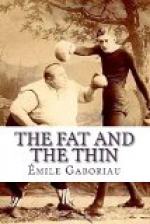However, during his brother’s brief illness Quenu himself had made certain reflections. One morning he proclaimed his desire to work, saying that he was now old enough to earn his own living. Florent was deeply touched at this. Just opposite, on the other side of the street, lived a working watchmaker whom Quenu, through the curtainless window, could see leaning over a little table, manipulating all sorts of delicate things, and patiently gazing at them through a magnifying glass all day long. The lad was much attracted by the sight, and declared that he had a taste for watchmaking. At the end of a fortnight, however, he became restless, and began to cry like a child of ten, complaining that the work was too complicated, and that he would never be able to understand all the silly little things that enter into the construction of a watch.
His next whim was to be a locksmith; but this calling he found too fatiguing. In a couple of years he tried more than ten different trades. Florent opined that he acted rightly, that it was wrong to take up a calling one did not like. However, Quenu’s fine eagerness to work for his living strained the resources of the little establishment very seriously. Since he had begun flitting from one workshop to another there had been a constant succession of fresh expenses; money had gone in new clothes, in meals taken away from home, and in the payment of footings among fellow workmen. Florent’s salary of eighteen hundred francs was no longer sufficient, and he was obliged to take a couple of pupils in the evenings. For eight years he had continued to wear the same old coat.
However, the two brothers had made a friend. One side of the house in which they lived overlooked the Rue Saint Jacques, where there was a large poultry-roasting establishment[*] kept by a worthy man called Gavard, whose wife was dying from consumption amidst an atmosphere redolent of plump fowls. When Florent returned home too late to cook a scrap of meat, he was in the habit of laying out a dozen sous or so on a small portion of turkey or goose at this shop. Such days were feast days. Gavard in time grew interested in this tall, scraggy customer, learned his history, and invited Quenu into his shop. Before long the young fellow was constantly to be found there. As soon as his brother left the house he came downstairs and installed himself at the rear of the roasting shop, quite enraptured with the four huge spits which turned with a gentle sound in front of the tall bright flames.
[*] These rotisseries, now all but extinct, were at one time a particular feature of the Parisian provision trade. I can myself recollect several akin to the one described by M. Zola. I suspect that they largely owed their origin to the form and dimensions of the ordinary Parisian kitchen stove, which did not enable people to roast poultry at home in a convenient way. In the old French cuisine, moreover, roast




